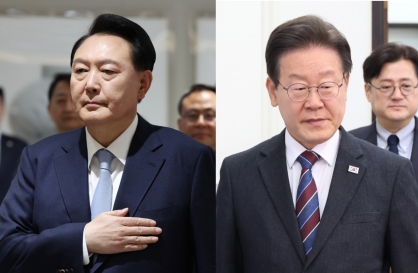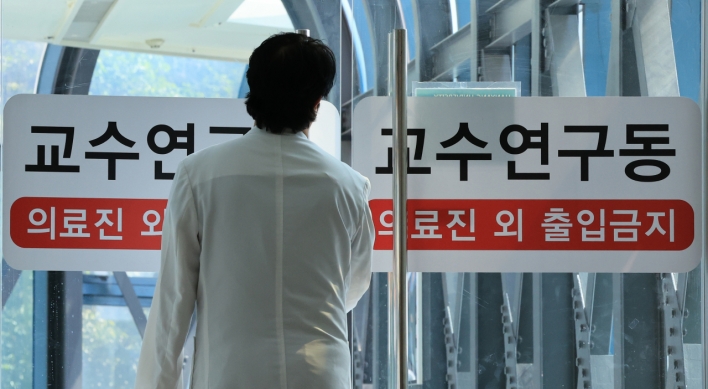[Editorial] Focus on key issues
Parties need to discuss restricting president’s personnel authority to reduce imperial power
By Korea HeraldPublished : April 5, 2018 - 17:52
Ten days have passed since President Moon Jae-in proposed to the National Assembly a bill for a constitutional amendment on March 26, but parliamentary negotiations have been in a deadlock from the beginning. Floor leaders of four parties discussed the issue Wednesday, but have failed to narrow their differences.
In the meeting, Rep. Kim Sung-tae of the main opposition Liberty Korea Party argued that Moon as the bill proponent needs to come out to negotiations with the floor leaders. Rep. Woo Won-sik, Kim’s counterpart of the ruling Democratic Party of Korea, rejected the suggestion.
Conditions for parliamentary debates on the constitutional amendment were set to some degree Tuesday when the conservative opposition party proposed its own bill. But rough sailing is expected, with Woo criticizing the bill and Kim demanding Moon be involved in negotiations.
The government and Liberty Korea Party bills -- the Democratic Party has not submitted its bill -- are so different from each other that it seems difficult to find middle ground.
As for the key issue of adjusting the presidential power, Moon’s bill proposes a four-year, two-term presidency, while the party proposes a prime minister be elected by the parliament -- not necessarily from among the lawmakers -- and that as quid pro quo, the president have authority to dissolve the parliament.
Besides, the government proposal has a number of new articles and phrases that reflect liberal and leftist ideology. They are certain to cause controversies and face opposition.
If the National Assembly really intends to amend the Constitution this time, the ruling and opposition parties must strive hard to strike a deal nonetheless, though it may take some time. It is then reasonable not to try to reach agreements on as many issues as possible. Rather, they must set it as their goal to compromise only on one or two essential points.
Strictly speaking, whether the presidency should be up to two terms of four years has little to do with the problems of an imperial presidential system. The term of the president and the number of terms are merely a matter of choice by the people. Nevertheless, this does not necessarily mean a parliamentary system is more effective than a presidential system in preventing the harmful consequences of the presidency. Presidents of all systems are not imperial.
The thing to consider is how much authority a president should have and how properly his or her power will be checked. In this light, Moon’s bill does not provide answers to those questions. When it comes to reducing an imperial presidential power and holding a president from abusing his or her authority, the Liberty Korea Party’s proposal seems to be a step forward in that it seeks to share current presidential power with the parliament. And yet the party’s bill is not without its fault. If a prime minister clashes head-on with the president over major policies, chaos would be unavoidable until a new parliament and new prime minister were to be elected.
Both systems have their good and bad points. Considering the limitations of each system, another alternative is worth discussion.
One effective way to reduce imperial authority under presidential or parliamentary systems can be found in a president’s personnel authority. A president takes grip on state affairs mainly through appointments and dismissals of senior officials. Imperial authority can be reduced substantially if checks are strengthened against the president’s personnel authority over intelligence and law enforcement agencies, for example in the prosecution, police and tax authorities.
If these agencies are able to act more freely from presidential personnel measures, the negative consequences of a monarchical power, as seen in corruption scandals involving presidents of the past, can be prevented significantly.
The problems of Korea’s presidential system have originated largely from omnipotent and absolute authority conferred on a president over a wide array of organizations. The National Assembly must focus debates on constitutional amendment on that.
To speed negotiations and work out a compromise bill without fail, ruling and opposition parties had better not discuss new ideologically sensitive articles and phrases that will divide public opinion and require long-term deliberation. They must concentrate on a few core issues, including how to reduce imperial presidential power.
In the meeting, Rep. Kim Sung-tae of the main opposition Liberty Korea Party argued that Moon as the bill proponent needs to come out to negotiations with the floor leaders. Rep. Woo Won-sik, Kim’s counterpart of the ruling Democratic Party of Korea, rejected the suggestion.
Conditions for parliamentary debates on the constitutional amendment were set to some degree Tuesday when the conservative opposition party proposed its own bill. But rough sailing is expected, with Woo criticizing the bill and Kim demanding Moon be involved in negotiations.
The government and Liberty Korea Party bills -- the Democratic Party has not submitted its bill -- are so different from each other that it seems difficult to find middle ground.
As for the key issue of adjusting the presidential power, Moon’s bill proposes a four-year, two-term presidency, while the party proposes a prime minister be elected by the parliament -- not necessarily from among the lawmakers -- and that as quid pro quo, the president have authority to dissolve the parliament.
Besides, the government proposal has a number of new articles and phrases that reflect liberal and leftist ideology. They are certain to cause controversies and face opposition.
If the National Assembly really intends to amend the Constitution this time, the ruling and opposition parties must strive hard to strike a deal nonetheless, though it may take some time. It is then reasonable not to try to reach agreements on as many issues as possible. Rather, they must set it as their goal to compromise only on one or two essential points.
Strictly speaking, whether the presidency should be up to two terms of four years has little to do with the problems of an imperial presidential system. The term of the president and the number of terms are merely a matter of choice by the people. Nevertheless, this does not necessarily mean a parliamentary system is more effective than a presidential system in preventing the harmful consequences of the presidency. Presidents of all systems are not imperial.
The thing to consider is how much authority a president should have and how properly his or her power will be checked. In this light, Moon’s bill does not provide answers to those questions. When it comes to reducing an imperial presidential power and holding a president from abusing his or her authority, the Liberty Korea Party’s proposal seems to be a step forward in that it seeks to share current presidential power with the parliament. And yet the party’s bill is not without its fault. If a prime minister clashes head-on with the president over major policies, chaos would be unavoidable until a new parliament and new prime minister were to be elected.
Both systems have their good and bad points. Considering the limitations of each system, another alternative is worth discussion.
One effective way to reduce imperial authority under presidential or parliamentary systems can be found in a president’s personnel authority. A president takes grip on state affairs mainly through appointments and dismissals of senior officials. Imperial authority can be reduced substantially if checks are strengthened against the president’s personnel authority over intelligence and law enforcement agencies, for example in the prosecution, police and tax authorities.
If these agencies are able to act more freely from presidential personnel measures, the negative consequences of a monarchical power, as seen in corruption scandals involving presidents of the past, can be prevented significantly.
The problems of Korea’s presidential system have originated largely from omnipotent and absolute authority conferred on a president over a wide array of organizations. The National Assembly must focus debates on constitutional amendment on that.
To speed negotiations and work out a compromise bill without fail, ruling and opposition parties had better not discuss new ideologically sensitive articles and phrases that will divide public opinion and require long-term deliberation. They must concentrate on a few core issues, including how to reduce imperial presidential power.
-
Articles by Korea Herald



![[KH Explains] Will 6-day workweek for executives help Samsung avert crisis?](http://res.heraldm.com/phpwas/restmb_idxmake.php?idx=644&simg=/content/image/2024/04/21/20240421050096_0.jpg&u=20240421164408)


![[AtoZ into Korean mind] Humor in Korea: Navigating the line between what's funny and not](http://res.heraldm.com/phpwas/restmb_idxmake.php?idx=644&simg=/content/image/2024/04/22/20240422050642_0.jpg&u=)





![[Herald Interview] Why Toss invited hackers to penetrate its system](http://res.heraldm.com/phpwas/restmb_idxmake.php?idx=644&simg=/content/image/2024/04/22/20240422050569_0.jpg&u=20240422150649)






![[Herald Review] Xdinary Heroes kicks off five-month-long project with solo concert, teases new album](http://res.heraldm.com/phpwas/restmb_idxmake.php?idx=652&simg=/content/image/2024/04/22/20240422050539_0.jpg&u=20240422152154)
![[Today’s K-pop] Illit logs 100m Spotify streams with debut song](http://res.heraldm.com/phpwas/restmb_idxmake.php?idx=642&simg=/content/image/2024/04/22/20240422050650_0.jpg&u=)